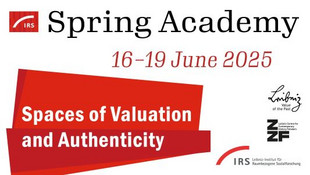Main Content
IRS Spring Academy 2025: Spaces of Valuation and Authenticity
The concept of “value” is multifaceted, encompassing appreciation, aesthetics, scarcity, performance, and price, and is shaped by cultural and social contexts. Closely related is the idea of “authenticity,” which, though often seen as objective, is also socially negotiated and symbolically charged. The IRS Spring Academy 2025 explores the historical and spatial dimensions of value and authenticity from interdisciplinary perspectives, emphasizing how symbolic associations and dissociations shape perceptions of worth. Special focus is given to urban spaces like Potsdam, where tensions between economic and cultural values, restoration and decay, and historical authenticity and present-day interests are especially visible. The academy combines conceptual, empirical, and methodological perspectives to explore these dynamics, emphasizing how value is spatially and historically embedded.
The 8th edition of the IRS Spring Academy will take place from 16-19 June in cooperation with the Leibniz Centre for Contemporary History Potsdam (ZZF) / Leibniz Research Alliance Value of the Past.
The application is closed.
Programme
Speakers and Lecturers
Patrick Aspers University of St. Gallen
Christoph Bernhardt Leibniz Institute for Research on Society and Space
Stefanie Brünenberg Leibniz Institute for Research on Society and Space
Melanie Fasche Sotheby’s Institute of Art London
Daniel Hadwiger Curator at the Documentation Centre for Displacement, Expulsion, Reconciliation in Berlin
Rebecca Madgin University of Glasgow
Manfred Kühn Leibniz Institute for Research on Society and Space
Björn-Martin Kurzrock RPTU University in Kaiserslautern-Landau
Cecilia Pasquinelli University of Naples Parthenope
John Pendlebury Newcastle University


